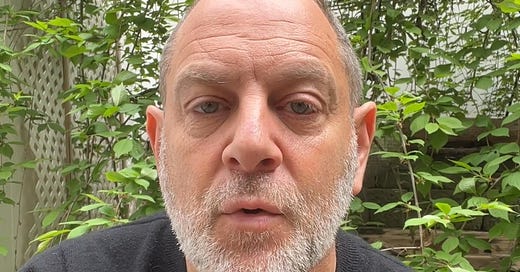Playback speed
×
Share post
Share post at current time
Share from 0:00
0:00
/
0:00
Transcript
Just Say: Selah!
Weekly Vid Recap of Below the Bible Belt
Apr 19, 2024
Sometimes we need strong words to slow us down, to help us pause with purpose.
Such a word is the old SELAH.
Bono, from the band U2, my teen crush, and a devout Christian, famously proclaimed it when performing on the Jimmy Kimmel show a few years ago: "Take you to church, Selah," right before the choir started singing. Ye, or Kanye West named a track on his 2019 album SELAH and defined it as a term meaning "to look back and reflect upon".
AMEN SELAH! You’ve heard it. I’ve heard it. Multiple times. Now that we are making our way through the PSALMS - or the PSLAMS as I like to call them - there’s already been a few Selah’s dropped in. What does this word actually mean and why does it feel important at this moment?
This word Selah occurs 74 times in the Hebrew Bible and 71 times in 39 of the Psalms + three times in the prophecies of Habakkuk. It’s usually at the end of a poem or paragraph so it’s a sort of stop sign. Possibly for the musicians who would sing and play these poetic prayers out loud.
It would be translated in Aramaic and Greek, and later in English As “always” or ‘Forever” and it is likely derived from the root SELAH which means to "to lift up voices" or "to exalt," or ‘amplify’ - pause and reflect.
But what’s fascinating about this word is not exactly what it meant but it what stands for today -- it is one of the very few Hebrew words from the original hebrew bible that in most cases is not translated into other languages - including English - because few know what it means -- but transliterated -- used as is in its original archaic and odd form. Hallelujah is yet another one of those words. Also big in the Psalms.
Selah is a unicorn.. in itself an invitation to pause and reflect on the fact that not all ancient concepts and ideas are translatable or transmittable across time. That some words from the past contain mysteries that elude us and that’s ok. Selah is as solid as a rock and as flimsy as the fog and we say it when we end a verse or a big speech as if to say -- there’s so much more to reflect here. The end. But not.
On this shabbat as we prepare for Passover with all its mysterious rituals and meanings, in the middle of this terrible time of hardship and sorrow, empty chairs around our Seder tables and so many displaced, mourning, wounded and struggling for freedom -- SELAH is a way for us to echo always, and forever, that what’s at stake is the sacred essence of our precious lives, that every single life is sacred and deserved dignity, and freedom and safety and security -- all of us one long poem that has no beginning and an no end.
I wish that the sacred days ahead offer us a glimpse of hope beyond the narrow places, songs and silences to lift the soul, and liberation as an action step for each of us to take on at this time, for all of our sakes and for everybody’s exodus - from what we were to who we want to be.
Shabbat Shalom.
Meaningful Passover to all. Let freedom ring, for all, with hope and joy.
Selah.
Recent Posts












Share this post